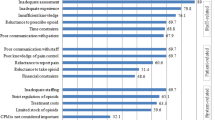Abstract
Objectives
The purposes of this study were to assess clinicians’ (n = 250) current practices and attitudes about cancer pain management and to identify perceived concerns about and barriers to pain control in urban cancer-treatment settings in Korea.
Materials and methods
Survey data (20 items) were collected either by mail or interview. Approximately 40% of the sample were nurses. More medical clinicians than surgical clinicians had more than 5 years of experience with cancer care (43 vs 31%) and committed more than 30% of their working hours to palliation (61 vs 19%). Significantly more medical clinicians claimed to be somewhat more or much more liberal than their professional peers in using analgesics compared with surgical clinicians (54 vs 35%). The liberal sample was more likely to be male (OR = 3.3, p < 0.001) and to be more experienced with cancer care (OR = 1.2, p < 0.001). Medical clinicians also reported more adequate pain-management training and a more proactive approach to assessing and treating pain.
Results
Overall, the greatest concerns regarding opioid use were safety, side effects, and fear of addiction. Inadequate pain assessment and lack of staff knowledge and time were identified as barriers to pain management. Unrealistic expectations and denial from both patient and family were the most troublesome issues for delivery of care to dying patients. This study suggests a more conservative attitude toward cancer pain management in Korea than in other countries surveyed in a similar manner.
Conclusion
A combination of routine professional education and dissemination of guidelines is needed to bring about significant improvement in cancer pain control in Korea.
Similar content being viewed by others
References
Chang YJ, Yun YH, Park SM et al (2005) Nurses’ willingness to maximize opioid analgesia for severe cancer pain, and its predictor. Support Care Cancer 13:743–751
Cleeland CS (1987) Barriers to the management of cancer pain. Oncology (Williston Park) 1:19–26
Cleeland CS, Cleeland LM, Dar R, Rinehardt LC (1986) Factors influencing physician management of cancer pain. Cancer 58:796–800
Cleeland CS, Gonin R, Hatfield AK et al (1994) Pain and its treatment in outpatients with metastatic cancer. N Engl J Med 330:592–596
Hewitt DJ (2001) The management of pain in the oncology patient. Obstet Gynecol Clin North Am 28:819–846
Hyun MS, Lee JL, Lee KH et al (2003) Pain and its treatment in patients with cancer in Korea. Oncology 64:237–244
Kim JA, Choi YS, Lee J et al (2005) Reliability and validity of the Korean Cancer Pain Assessment Tool (KCPAT). J Korean Med Sci 20:877–882
Larue F, Colleau SM, Brasseur L, Cleeland CS (1995) Multicentre study of cancer pain and its treatment in France. BMJ 310:1034–1037
Ministry of Health and Welfare (2003) Annual Report of the Central Cancer Registry in Korea. Seoul, South Korea
Schug SA, Zech D, Dorr U (1990) Cancer pain management according to WHO analgesic guidelines. J Pain Symptom Manage 5:27–32
von Roenn JH, Cleeland CS, Gonin R, Hatfield AK, Pandya KJ (1993) Physician attitudes and practice in cancer pain management. A survey from the Eastern Cooperative Oncology Group. Ann Intern Med 119:121–126
Wang XS, Nguyen PY, Nguyen BD, Jones PH, Magruder E, Cleeland CS (2003) Survey on cancer pain management among Vietnam clinicians. American Pain Society 22nd annual scientific meeting, Chicago, IL
World Health Organization (1996) Cancer pain relief: with a guide to opioid availability. World Health Organization, Geneva
Yu S, Wang XS, Cheng Y, Yang J, Cleeland CS (2001) Special aspects of cancer pain management in a Chinese general hospital. Eur J Pain 5:15–20
Yun YH, Heo DS, Lee IG et al (2003) Multicenter study of pain and its management in patients with advanced cancer in Korea. J Pain Symptom Manage 25:430–437
Yun YH, Mendoza TR, Heo DS et al (2004) Development of a cancer pain assessment tool in Korea: a validation study of a Korean version of the brief pain inventory. Oncology 66:439–444
Yun YH, Park SM, Lee K et al (2005) Predictors of prescription of morphine for severe cancer pain by physicians in Korea. Ann Oncol 16:966–971
Zech DF, Grond S, Lynch J, Hertel D, Lehmann KA (1995) Validation of World Health Organization Guidelines for cancer pain relief: a 10-year prospective study. Pain 63:65–76
Acknowledgments
The authors gratefully acknowledge the Hawn Foundation, Dallas, Texas, for its support of this project. We acknowledge with appreciation the assistance from Professor Hoon Kyo Kim, Yeon Jang, Tae Kwan Kim, Il Hae Seo, Chang Hyunk An, So Young Yang, Seong Hee Lee, Hematooncology and General Surgery nurse team of Saint Mary’s Hospital and Kangnam Saint Mary’s Hospital, Saint Vincent’s Hospital, and everyone who participated in this study. We also acknowledge with appreciation the editorial assistance of Ms. Jeanie F. Woodruff in the Department of Symptom Research at M. D. Anderson Cancer Center.
Author information
Authors and Affiliations
Corresponding author
Rights and permissions
About this article
Cite this article
Jeon, Y.S., Kim, H.K., Cleeland, C.S. et al. Clinicians’ practice and attitudes toward cancer pain management in Korea. Support Care Cancer 15, 463–469 (2007). https://doi.org/10.1007/s00520-006-0183-x
Received:
Accepted:
Published:
Issue Date:
DOI: https://doi.org/10.1007/s00520-006-0183-x




